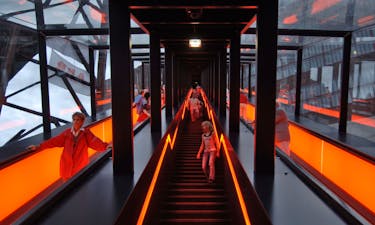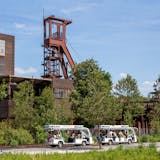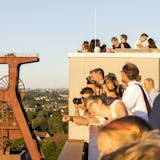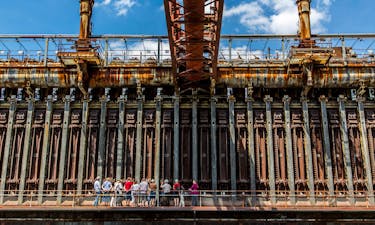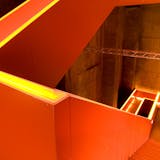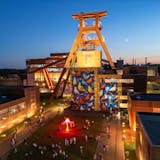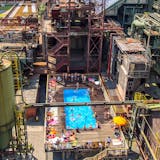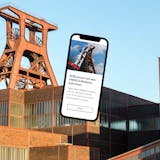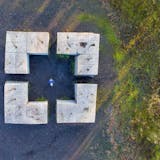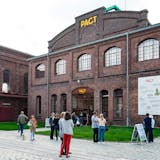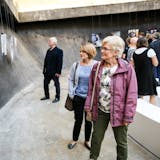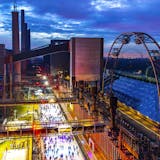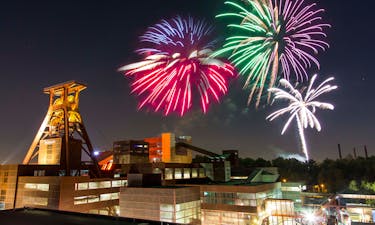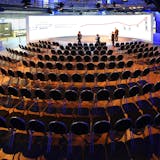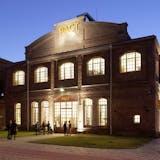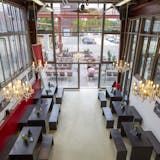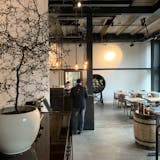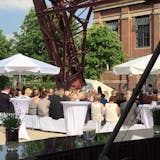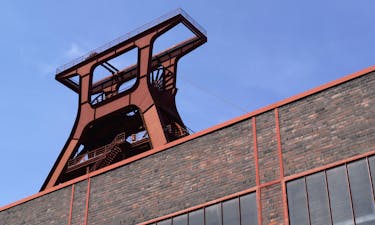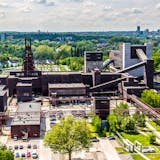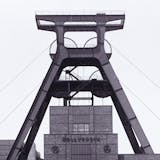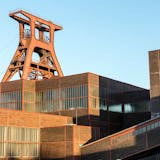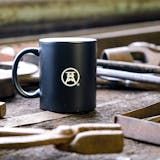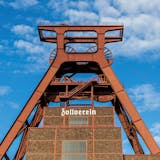Begrenzte Öffnungszeiten am 01.09.2025
Aufgrund einer nicht-öffentlichen Veranstaltung am Montag, den 01.09.2025, ist die Kohlenwäsche mit Ruhr Museum, Besucherzentrum Ruhr, Portal der Industriekultur, Café Kohlenwäsche und Buchhandlung Walther König ab 16:30 Uhr geschlossen.
Bei allen Fragen zu den Angeboten auf dem UNESCO-Welterbe Zollverein hilft Ihnen die Hotline 0201 246810 montags bis samstags zwischen 8:00 und 18:00 Uhr sowie an Sonn- und Feiertagen zwischen 10:00 und 18:00 Uhr gerne weiter. Oder senden Sie eine E-Mail an info@zollverein.de.
Due to a private event on Monday, 1 September 2025, the Coal Washing Plant, including the Ruhr Museum, Ruhr Visitor Centre, Industrial Heritage Portal, Café Kohlenwäsche and Walther König bookshop, will be closed from 4:30 p.m. onwards.
If you have any questions about the attractions at the UNESCO World Heritage Site Zollverein, please call the hotline on 0201 246810, Monday to Saturday between 8 a.m. and 6 p.m. and on Sundays and public holidays between 10 a.m. and 6 p.m. Alternatively, send an email to info@zollverein.de.

Zeche
Coal Mine
Zeche
Die Geschichte Zollvereins beginnt mit dem Duisburger Unternehmer und Industriepionier Franz Haniel, der 1847 im Essener Norden, westlich des Dorfes Katernberg, den ersten Schacht abteufen ließ. Zwischen 1847 und 1986 wurden auf der Zeche Zollverein insgesamt 240 Mio. Tonnen Kohle abgebaut, über und unter Tage waren bis zu 8.000 Bergleute im Schichtwechsel beschäftigt. Das Bergwerk mit seinen weitgehend automatisierten Arbeitsabläufen galt als das größte und leistungsfähigste weltweit. Die letzte der insgesamt zwölf Schachtanlagen wurde 1932 in Betrieb genommen und aufgrund der funktionalen, neusachlichen Gestaltung nach Plänen von Fritz Schupp und Martin Kremmer von Beginn an als technisches und ästhetisches Meisterwerk der Moderne angesehen. Die Zeche Zollverein schloss am 23. Dezember 1986 als letzte von insgesamt rund 290 Zechen in Essen, der einst größten Bergbaustadt Europas.
Coal Mine
The history of Zollverein begins with the Duisburg entrepreneur and industrial pioneer Franz Haniel, who had the first shaft sunk in 1847 in the north of Essen, west of the village of Katernberg. Between 1847 and 1986, a total of 240 million tons of coal were mined at the Zollverein Coal Mine, with up to 8,000 miners working above and below ground in alternating shifts. The mine with its largely automated work processes was considered to be the largest and most efficient in the world. The last of the twelve shaft sites was put into operation in 1932 and, thanks to its functional, new-fangled design based on plans by Fritz Schupp and Martin Kremmer, it was regarded a technical and aesthetic masterpiece of modernity right from the start. The Zollverein Coal Mine closed on December 23, 1986, as the last of a total of around 290 coal mines in Essen, once the largest mining city in Europe.



Begrenzte Öffnungszeiten am 01.09.2025
Aufgrund einer nicht-öffentlichen Veranstaltung am Montag, den 01.09.2025, ist die Kohlenwäsche mit Ruhr Museum, Besucherzentrum Ruhr, Portal der Industriekultur, Café Kohlenwäsche und Buchhandlung Walther König ab 16:30 Uhr geschlossen.
Bei allen Fragen zu den Angeboten auf dem UNESCO-Welterbe Zollverein hilft Ihnen die Hotline 0201 246810 montags bis samstags zwischen 8:00 und 18:00 Uhr sowie an Sonn- und Feiertagen zwischen 10:00 und 18:00 Uhr gerne weiter. Oder senden Sie eine E-Mail an info@zollverein.de.
Due to a private event on Monday, 1 September 2025, the Coal Washing Plant, including the Ruhr Museum, Ruhr Visitor Centre, Industrial Heritage Portal, Café Kohlenwäsche and Walther König bookshop, will be closed from 4:30 p.m. onwards.
If you have any questions about the attractions at the UNESCO World Heritage Site Zollverein, please call the hotline on 0201 246810, Monday to Saturday between 8 a.m. and 6 p.m. and on Sundays and public holidays between 10 a.m. and 6 p.m. Alternatively, send an email to info@zollverein.de.
